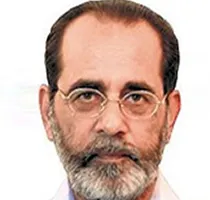-
CENTRES
Progammes & Centres
Location
Recent verdicts have strengthened civilian authority in principle, but left the PM in a spot with the army

Pakistan Prime Minister Imran Khan has warded off strong challenges from his political opposition, including a stiff one from Maulana Fazlur Rehman, who launched a march to Islamabad last month to topple the Tehreek-e-Insaf government. But, for Khan, the challenges posed by the recent judicial decisions are proving to be much bigger political headaches.
First came the suspense over the extension of the Chief of the Army Staff (COAS), General Qamar Javed Bajwa’s tenure during the last week of November. General Bajwa’s three-year tenure was to end on November 28. However, a notification signed by Khan on August 19 stated that General Bajwa was “appointed for another term of three years from the date of completion of current tenure”. The decision was justified on the basis of the “regional security environment”.
On November 26, a three-judge bench of the Supreme Court, headed by chief justice Asif Saeed Khosa, rejected an application to withdraw the petition, questioning the extension, declaring that it fell in “the domain of public interest”. During the hearing, Attorney General (AG) Anwar Mansoor Khan failed to explain how the PM had issued the notification when the appointing authority is the president. A presidential order described it as “extension” while the PM had mentioned “reappointment”. Further, since only 11 Cabinet members out of 25 were present when the decision was taken, how had the views of the other members been ascertained? Dismissing the AG’s defence, citing “clerical error”, the bench suspended the extension order.
Law minister Farogh Naseem resigned to appear as defence lawyer for General Bajwa. The following day, questions regarding the tenure of the COAS, the terms and conditions, retirement perks and precedents could not be answered. The bench dismissed a second notification produced by the AG, declaring that it failed to meet the test of law, procedure and justifiable grounds for extension.
Finally, on November 28, the court approved a third notification “appointing General Bajwa as COAS under Article 243(4)(b) of the Constitution for a period of six months with effect from 28.11.2019”. The government provided an undertaking that parliament will pass legislation to determine “tenure” and “terms and conditions of service”. The judgment has diminished the army by exposing the COAS’s untrammelled powers, as well as the ineptness of the civilian government.
The second judicial decision to pose a challenge came on December 17 when a special court, headed by Peshawar High Court chief justice Waqar Ahmed Seth, convicted former COAS General Pervez Musharraf of high treason, awarding him a death sentence. The treason case pertains to the declaration of a state of emergency on November 3, 2007, following his showdown with the judiciary.
After the election of a Pakistan People’s Party government in 2008, a deal was brokered for President Musharraf to step down in return for promised indemnity. The situation changed when Nawaz Sharif came to power in 2013 and charged him with treason. The trial began after the indictment on March 31, 2014.
Despite being summoned repeatedly, General Musharraf never testified and left the country for medical treatment in March 2016. The then army chief, General Raheel Sharif, made it clear that the army was not going to disown one of its own, stating that “the army will preserve its own dignity and institutional pride”. After General Musharraf was declared an absconder and following the apex court’s direction, the special court moved forward with the trial.
Nervous about the outcome, the government sacked the prosecution team on October 23, and got a restraining order from the Islamabad High Court to prevent the pronouncement of judgment on November 28. On December 5, a new prosecution team asked that former PM Shaukat Aziz, law minister Zahid Hamid and chief justice Abdul Hameed Dogar be included as suspects for advising General Musharraf. The special court advised prosecution to file fresh indictments against the three and proceeded to announce its verdict.
Major General Asif Ghafoor, director-General, Inter Services Public Relations Pakistan, questioned how Musharraf could be named a traitor, and said that the decision “has been received with a lot of pain and anguish by the rank and file”. In the detailed judgment, Justice Seth had added that if found dead, the fugitive’s corpse “be dragged to the D-Chowk (in front of the Parliament House) and be hanged for three days”.
Having won the case, Imran Khan’s government is backing off furiously from its victory. It has decided to file a case against Justice Seth before the Supreme Judicial Council. AG Mansoor has said that the government will appeal against its “victory” in the Supreme Court.
For Imran Khan, who owes his elevation to the tacit backing of the army, legislating rules governing tenures of army chiefs in Pakistan is a politically charged exercise, and he would want support from Zardari and Sharif.
However, having been treated harshly by the government, Zardari and Sharif may have other ideas, and use the growing tensions between Imran Khan and the army to their advantage. Both judgments strengthen civilian authority, but for Imran Khan, these are serious political headaches.
This commentary originally appeared in Hindustan Times.
The views expressed above belong to the author(s). ORF research and analyses now available on Telegram! Click here to access our curated content — blogs, longforms and interviews.

Ambassador Rakesh Sood was a Distinguished Fellow at ORF. He has over 38 years of experience in the field of foreign affairs economic diplomacy and ...
Read More +